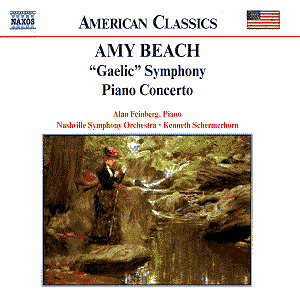Amy
Beach holds the distinction of being the first American woman
to gain international fame as a composer of large-scale works
of music. A heroine to women composers everywhere, Beach overcame
incredible odds and made a career as both a performing artist
and composer who was not only heard, but also taken very seriously.
She left behind a catalogue of some 300 works.
Born
in the Victorian era in New Hampshire, Amy Cheney Beach first
met roadblocks when her parents restricted her from public performance.
It was considered improper for women to have a career that was
anything other than domestic. When at the age of eighteen she
married Dr. Henry Harris Aubrey Beach, he placed further shackles
on her by only allowing her to play one public recital per year,
and insisting that she use the ‘moniker’ of Mrs. H.H.A. Beach,
thus depriving her of a measure of independence. Widowed at the
age of forty-four, Beach resumed her performing career and went
to Germany for further study. She died in 1944 after gaining much
fame both in the United States and abroad.
Her
abilities were miraculous indeed, and much of what she learnt
about form, orchestration and composition, she taught herself.
The two works on this disc are perhaps the apex of her major symphonic
output, and prove that she was a composer of phenomenal abilities.
One can only imagine what she might have accomplished had she
proper training been made available to her at an early age.
The
piano concerto is a rather massive work, heavy on lush orchestration
and virtuoso passagework. It tastes a good deal like Rachmaninoff,
except that the thematic content is not nearly as tight and well
constructed. On the whole, I found the piece to be somewhat out
of proportion with its lengthy first movement clocking in at about
the same time as the remaining three combined. On the plus side,
there are a number of winning features and although one does not
exactly leave the hall whistling any tunes, there are a number
of pleasant moments. The scherzo, dubbed perpetuum mobile rather
goes nowhere, and is on the whole an exercise in parallel sixths.
The Largo is elegant and tuneful and hints strongly at the influence
of the above-mentioned Russian. The rollicking finale is rather
Chopin-esque in its dancing triple meter.
Alan
Feinberg is certainly capable of making his way adroitly around
the keyboard. Alas, he is recorded entirely too far forward and
the bright tone of his instrument is often grating. There is no
real warmth to his playing, rather the sound, particularly in
the upper registers is over bright and shrill. The balance between
soloist and orchestra is way off and Maestro Schermerhorn has
some serious difficulty keeping his winds and brass in tune. As
I recall from having attended several concerts there, the Andrew
Jackson hall is no marvel for acoustics, and the sound never gets
a real bloom.
Beach’s
Gaelic symphony is somewhat of a rebuttal to Dvořák’s
embracing of Native American and African American folk tunes as
primary thematic material for new American symphonic works. Beach
contended that a composer should write from his or her own personal
heritage, and thus, she chose tunes from her ancestral British
Isles. As a result, the thematic continuity of the symphony fares
better than that of the concerto, and on the whole the work hangs
together quite well. Opening with a fine forward thrust, the first
movement gives way to a beautifully melodic Siciliana, which in
this performance is played excruciatingly out of tune by the winds.
Wrought with lovely solo writing and expressive orchestration
this is a work that deserves a more regular spot in the repertoire.
One hopes that it will soon receive a better performance than
this one. Although there are some nice moments here, the intonation
issues quite quickly disqualify this performance from anything
higher than about the second tier. Let us hope that Naxos does
not entrust too much more of its landmark series of American works
to this ensemble.
Program
notes are fine, sound quality leaves something to be desired,
especially for the brittle sound of the piano in the concerto
and the rather boxy quality of the orchestra. One is reminded
of old Columbia LPs at their worst. Recommended only for the deserved
attention of the repertoire.
Kevin
Sutton
see also review by Colin
Clarke
